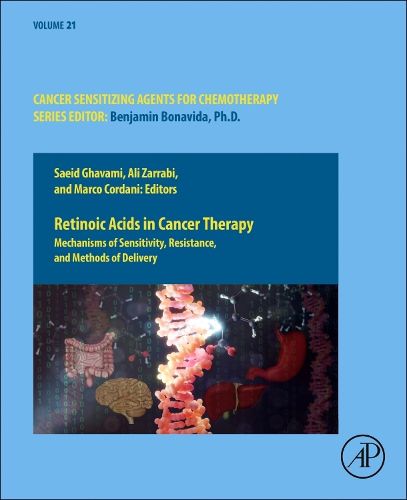Readings Newsletter
Become a Readings Member to make your shopping experience even easier.
Sign in or sign up for free!
You’re not far away from qualifying for FREE standard shipping within Australia
You’ve qualified for FREE standard shipping within Australia
The cart is loading…






Retinoic Acids in Cancer Therapy: Mechanisms of Sensitivity, Resistance, and Methods of Delivery, Volume 21 offers a detailed exploration of how All Trans Retinoic Acid (ATRA) functions to kill cancer cells, as well as the survival mechanisms of certain cells when treated with this drug. This comprehensive book delves into the specific cell pathways and compartments that are involved in the action of retinoic acids (RAs) in inhibiting cell proliferation across various cancers, providing invaluable insights for continued research and improved therapeutic approaches in oncology.
The book comprises 16 chapters that address the molecular structure and biological properties of ATRA, elucidate the mechanisms of resistance to ATRA, and evaluate its efficiency in treating seven different cancers. Additionally, it discusses strategies to enhance ATRA cancer treatment and offers future perspectives on its applications. As a vital resource for health professionals, researchers, and students alike, this volume aims to expand the collective understanding of ATRA's therapeutic potential and inspire the development of new, more effective cancer treatments.
$9.00 standard shipping within Australia
FREE standard shipping within Australia for orders over $100.00
Express & International shipping calculated at checkout
Retinoic Acids in Cancer Therapy: Mechanisms of Sensitivity, Resistance, and Methods of Delivery, Volume 21 offers a detailed exploration of how All Trans Retinoic Acid (ATRA) functions to kill cancer cells, as well as the survival mechanisms of certain cells when treated with this drug. This comprehensive book delves into the specific cell pathways and compartments that are involved in the action of retinoic acids (RAs) in inhibiting cell proliferation across various cancers, providing invaluable insights for continued research and improved therapeutic approaches in oncology.
The book comprises 16 chapters that address the molecular structure and biological properties of ATRA, elucidate the mechanisms of resistance to ATRA, and evaluate its efficiency in treating seven different cancers. Additionally, it discusses strategies to enhance ATRA cancer treatment and offers future perspectives on its applications. As a vital resource for health professionals, researchers, and students alike, this volume aims to expand the collective understanding of ATRA's therapeutic potential and inspire the development of new, more effective cancer treatments.